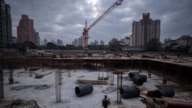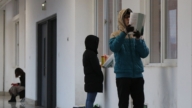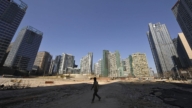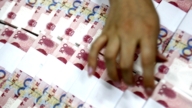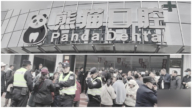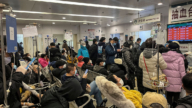【新唐人2014年05月16日訊】日前,中共央行要求商業銀行及時審批和發放符合條件的個人住房貸款。外界認為,今年以來,房地產下滑,導致中國各項經濟指標明顯出現疲軟跡象,央行企圖再次出手救市。不過,專家指出,讓政府來控制經濟發展,已經使中國經濟陷入兩難境地,政府不刺激房地產經濟會下滑,而刺激又會導致金融危險。
5月12號,在中共央行副行長劉士余主持的會議上,央行官員與15家大型銀行的高管,討論了住房抵押信貸政策。央行要求與會的商業銀行提高服務效率,及時審批,和發放符合條件的個人住房貸款,合理確定「首套房」貸款利率水平。
參加會議的包括工商銀行、農業銀行、中國銀行、建設銀行、交通銀行等15家商業銀行的高管。
大陸金融分析師任中道:「房地產跟中共政府的利益是極度相關的,因為很多的地方政府的債務,承諾是以土地出讓的收入,作為償還債務的條件,一旦沒有錢,開發商倒閉,銀行出現問題,壞賬成堆,地方政府出現債務違約,這些都是關聯在一起的。」
北京大學光華管理學院博士生導師王建國:「不放貸的話,房地產的下滑雪上加霜,很多就垮掉了,本來現在經濟就不是很景氣,主要是起這個作用。第二也是救市,房地產崩盤的話,對中國經濟的打擊,那就是金融危機,但是,3、4線城市和2、3線城市已經垮得很厲害,即使放開貸款,也不見得就救得了房地產,這種形勢,只怕也沒有很多人去買房子。」
房地產業在整個社會的產業鏈中影響到方方面面,前端是原材料,鋼材、水泥等建材﹔中間產品關係到設計、建築工程、裝修等行業﹔而最後形成的商業物業和住房,拉動市場活動等,比如入住者購買家電、傢俱、床上用品等消費品﹔另外還有很多文化屬性產品,有了房子,年輕夫婦還會考慮生孩子,又涉及嬰幼兒用品、教育等產業。
據中共統計局發佈的最新統計數據,今年1-4月份,住宅房銷售額同比下降了9.9%,辦公樓銷售額下降10.2%。而4月末,商品房等待銷售的面積高達5萬2652平方米而建築開工數量下滑了近25%。
統計局發佈的另一份4月份數據表明,房地產市場的放緩,已經對工業產值、零售額以及機械、土地和其他實物資產的投資造成連鎖效應,所有這些指標都低於預期。
美國《華爾街日報》評論說,實際放緩勢頭比數據顯示的可能更慘。
大陸投資顧問鄧先生:「房地產是個綜合產業,它的風險其實早已分散到各行各業去了,起來的時候是眾星捧月,垮的時候肯定是節節敗退,本身它是一種剛需,但問題是它已經過剩和泡沫。」
為提振需求的不足,中共領導人在今年2月宣佈了一系列「微刺激」政策,包括針對中小企業的稅費減免措施,和增加交通設施投資等。
王建國:「事實上,真正害怕房地產下跌的還是政府,原來那些調控政策,並不是要真的要把房地產調下去。房地產如果崩盤的話,對銀行打擊非常大,那些存款就會有風險,銀行就會有倒閉的可能,那政府要救銀行又得發鈔票,發鈔票又會導致通貨膨脹,本來鈔票發的就很多了,所以中國現在這個經濟很麻煩,房地產刺激會有金融風險,不刺激經濟又下滑。」
今年一季度,四個省份的房地產投資為負值,其中黑龍江和吉林的降幅超過了25%。財經學者杜猛不久前表示,中國樓市已經出現典型的生產過剩危機,全國有6800萬套空置房。日本《野村證券》也曾指出,中國住房已經嚴重過剩,房地產的泡沫已經破裂。
採訪編輯/劉惠 後製/鍾元
Housing Oversupply Causing Major Crisis for Chinese Economy
Recently the Chinese Communist Party (CCP)’s Central Bank
asked commercial banks to timely approve and issue
housing loans to qualified individuals.
The outside world thinks the YTD real estate market slide
has caused economic indicators to clearly signal a softening.
The Central Bank attempts another bailout.
However, experts point out that Governmental control of
economic growth has led to a dilemma in the Chinese economy.
Without governmental stimulation, the real estate market will
collapse; while the stimulus will lead to financial dangers.
During the meeting chaired by CCP Central Bank
Vice Governor Liu Shiyu on May 12,
Central Bank officials and executives of 15 large banks
discussed mortgage and credit policies.
The Central Bank asked commercial banks to timely approve
and issue loans to qualified individuals,
and set reasonable interest rates for first-time home buyers.
Fifteen commercial banks joined the meeting, including
Industrial and Commercial Bank of China,
Agricultural Bank of China, Construction Bank
and Bank of Communications.
Chinese Financial Analyst Ren Zhongdao: “Real estate is
closely tied to the interests of the CCP Government.
A lot of Local Government’s debts are based on land revenue.
If there was no money, developers would go bankrupt,
banks would run into problems, bad debts would accumulate
and Local Government debts would default. All these are related."
Beijing University Guanghua School of Management
doctoral advisor Wang Jianguo: “Without issuing loans,
the real estate market will drop further and even collapse.
The economy is already not very good at present.
Secondly it helps save the market.
A real estate crash would cause financial crisis in China.
However, the real estate at second tier, third tier
and fourth tier cities has dropped badly.
Even with loans freed up, it would not save the market.
In such a situation, I’m afraid not many people would buy."
Real estate impacts many aspects of the industrial chain.
The front end is about raw materials, steel, cement
and other building materials;
middle level products are design, construction,
furnishing and other industries,
while the final level is around commercial property and housing,
such as appliances, furniture, bedding and other consumer goods.
There are also cultural attributes. Young couples would consider
having children and that leads to infant supplies, education and
other industries.
According to the latest data released by the Bureau of Statistics,
the sales of residential housing fell by 9.9% and the sales of
office building fell 10.2% from January to April 2014,
compared to the same period in 2013.
Ar the end of April, the commercial housing inventory
reached 52,652 square meters, while new construction
dropped nearly 25%.
Another set of data released by the Bureau of Statistics in April
showed that the slowdown in the real estate market has caused
a chain effect on industrial output,
retail sales and investment in machinery, land and other physical
assets..All of these indicators are lower than expected.
U.S. Wall Street Journal commented that the actual
slowdown may be even worse than what the data shows.
Chinese investment consultant Mr. Deng: “Real estate is a
comprehensive industry and its risks have in fact already
penetrated into all walks of life.
When it is prosperous, everyone worships it;
when it collapses, it is definitely out of favor.
It is a demand all by itself. But the problem is that it has
boom and bust cycles."
To boost demand, the CCP leaders announced a series of
“micro-stimuli" policies in February, 2014,
including tax relief measures for small and medium enterprises,
and increasing investments in transportation facilities.
Wang Jianguo: “In fact it is the Government who is afraid of
a real estate crash.
Its original control policy was not really to push down real estate.
A real estate collapse would be a very big blow to the banks.
Deposits would be at risk, so banks would likely collapse.
Then the government would again need to save banks by printing
money, which leads to inflation.
China has printed too much money already. China’s economy
is in trouble.
Stimulating real estate has financial risks,
But not to stimulate, the economy would decline. “
In Q1 2014,real estate investment in four provinces
were negative,
with Heilongjiang and Jilin declining more than 25 %.
Finance scholars Du Meng recently said that
China’s property market is in a typical crisis of overproduction,
with 68 million vacant housing units.
Japan’s Nomura Securities also pointed out that
China has a serious surplus of housing and the real
estate bubble has burst.
Interview & Edit/Liu Hui Post-Production/Zhong Yuan




